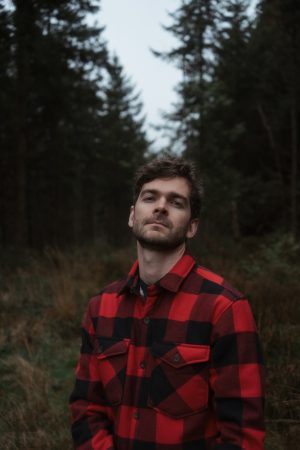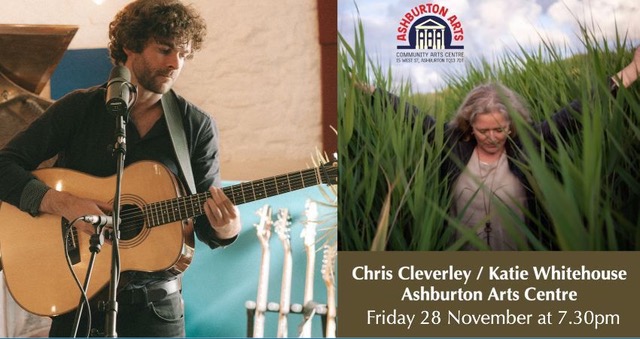Band Meeting: A Trio of Artists
Three musical folk artists will be performing at the Ashburton Arts Centre this coming Friday (28th November) and we asked some questions…
CHRIS CLEVERLEY
Your new collection, ‘Gods of All Things’, digs even deeper into the emotional contradictions of winter. Is there one moment or lyric that reveals the whole project to you?
The First single from the record ‘Lord Of Chaos’, encapsulates the message. As someone without faith, often searching for meaning in a head-spinning world, I have been interested in exploring spiritual ideas from Ancient Britain and Pagan beliefs as analogy for this headspace. Herein, everything in our world – whether object, or aspect of nature, emotion or abstract idea – has a specific God overseeing it; The ‘Gods of All Things’. For example, there may be times when we’re spiraling out of control in our minds; here we appeal to the God of Spirals to guide us through and keep us whole. So this verse goes:
“Gods of oceans; Come, come release me.
Gods of spirals; Come, come release me.
Agents of chaos; Come, come release me.
Ye Gods of All Things; Come, come release me.”

Your sound blends 60s folk revival textures with 90s Pacific Northwest melancholy and your own ambient dream-folk aesthetic. On this project, did anything surprise you – a new influence creeping in, or an old one resurfacing?
Yes definitely. In the last 3 or so years, my recorded music has been taking a lot of influence from the sonic worlds of ambient Dream-Pop. There has been a big focus on electric guitars, synths, huge wide formless sounds underpinning the music. You could say a pronounced move away from the more acoustic feel of my earlier work. When making ‘Gods Of All Things’ I felt a very strong need to bring things home again. I’ve been playing so much guitar this year, including as a session player for two fantastic Devon based artists; Tobias Ben Jacob and Detta Kenzie. Through the hours behind my instrument, I re-established such a strong connection with those playing styles, digging out records from Nick Drake, Bert Jansch and Joni Mitchell for inspiration. When the time came over the Summer to bring my focus back to my own music, it felt essential to allow this passion for the instrument to shine through and take centre stage. As a result I would say this record is more like my earlier work than anything I’ve done for years. Almost 10 years to the day since my first record ‘Apparitions’ came out – a collection of songs based heavily around the traditions of 60s folk revival guitar – it really felt like things had come full circle.
Your live shows often feel like a shared exhale – a calm, grounded space. How do you craft that atmosphere onstage, especially during the intensity of the festive period?
I think it’s fair to say it’s kind of a strange thing we do; Small independent venues, intimate performances, such a narrow distance between artist and listener. You can hear every movement, every breath. We’re acutely aware of the silence, in contrast to the business and overstimulation of our daily lives. I think it’s important to acknowledge out loud this intensity, this tension. To work in a pressure release valve somehow. Empower people to ease into it at their own pace, in their own way. I want my performance to be lucid, open. I want people to feel they can join me in that headspace. It’s so important for everyone in the room to reach that place of collective inhibition, to receive the music and the messages with the full extent of their attentiveness.
I try to combine humour with deep reflection. Light and shade. Rise and fall. Encourage individual interpretation. If people are there to think deeply on their circumstances, I want them to have the space to do so. If people are there to unwind and forget the world I want that to be equally possible. It’s a balancing act between quite opposing experiences. You have to keep it light, but also not be afraid to dig deeper. I’m greatly inspired by the approaches of yoga nidra, and how sound, body and breath can be combined to generate a lucid headspace. I try to work these in, encourage people to embrace them, and hopefully find a place in their minds where they can receive the performance in the way that works for them.
You’re returning to Ashburton with these new songs. In your memory, is there a particular “Devon audience energy” – and how does it affect the way you play?
Devon is a place that has always been very kind to me and received my music with such openness. I always get the impression that the areas surrounding Totnes and Ashburton draw in people who have a strong affinity with nature, a great ability to think deeply and reflect, and a talent for introspection and inquisitiveness. I couldn’t ask for more from a room of people. These are the perfect qualities for a great two way connection. I’ve done the Ashburton show for the last three years and have always come away feeling a strong validation of what I do and a great drive to carry on doing it. I think that’s a true reflection of having found your people and spent a couple of beautiful hours in their revitalising company.
KATIE WHITEHOUSE
Katie, this is your only live performance of the year. What did it feel like to step back into preparing a set of songs and poems after focusing so much on championing other artists?
Honestly, it felt both exposing and nourishing. Most of my year is spent behind the scenes, supporting other people’s voices and helping them shape their stories – which I love. But returning to my own work required a quiet sort of courage. I had to make space for myself again, remember what it feels like to stand inside a song or a poem and let it breathe through me. There’s a softness and a stillness to that process that I’d almost forgotten. Preparing this set has reminded me that I’m allowed to take up space too – and that performing can be a form of coming home to myself.

Your writing holds space for vulnerability, clarity and quiet intensity. How are those themes evolving in your newer songs and poems since ‘Drawing Lines’?
My newer writing leans even further into themes of Time, Nature and Human Connection.. ‘Drawing Lines’ was very much about naming things – boundaries, losses, loves, truths. Since then I’ve allowed myself to write with more looseness, more trust in the moment. I’m exploring the edges between fragility and resilience, solitude and connection, and I’m less afraid of silence than I used to be. I’ll perform a couple from the upcoming collection at this gig, along with some older songs.
You’ll be joined by Dan Whitehouse for this show. How does his musical sensitivity colour or reshape your songs when you perform them live?
Dan has an extraordinary ability to listen. Not just musically, but emotionally. He never overwhelms a song; he simply illuminates it. When he plays electric guitar or brings in those subtle synth lines, it’s as if he builds a small universe around the words. He gives the songs space, breath, texture. Performing with him allows me to relax into the pieces more fully – to linger, to trust the moment, to let the music hold the weight of the emotion. It feels like a true conversation onstage, a shared atmosphere rather than accompaniment. I’m so privileged he’s joining me!
You and Chris share a taste for emotional truth and reflective writing. What do you feel links your creative worlds – and where do they diverge?
I think Chris and I share a lot of common ground. We both write from that place where emotion meets imagination, and we’re drawn to the quiet truths and the things that often go unsaid. Where we differ is in how we build our worlds. Chris’s music has this dreamy, cinematic scope and intricate guitar work. My writing is more stripped back – more like holding a candle in a dark room and inviting people closer. The desire to explore human nature and to connect as honestly as we can is something we both hold at the centre.
This gig promises a calm, reflective space at the end of the year. What kind of refuge do you hope people find in the room?
I hope people find a moment of breathing space. This time of year can feel noisy and demanding, and I want the room to offer something gentler – a place to settle, to feel held, to let whatever you’re carrying soften a little. If someone walks away feeling a touch lighter, or more connected to themselves, then that’s the refuge I hope we’ve created together.
Tickets for Friday evening are available here

